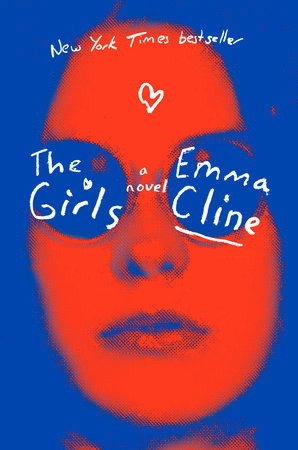
The Plot: It begins with a girl. A woman. Evie.
And the first time Evie saw the girls -- the girls that led her to Russell and, almost, to a night of death and blood.
And now. Now, that teenage girl is so far in the past -- that girl is a woman, a middle aged woman with a job who floats through her own life. She's house sitting for an old lover, in a shabby house, and the ex-lovers son and girlfriend show up. And they know who Evie is, who she was, and about Russell.
The whole world, of course, knows about Russell.
And Evie in the present looks back at a past world, and a past child, and that child who yearned for adulthood.
The Good: Much has already been written about Cline's debut novel, and how Russell and his followers, and the night of blood, are inspired by the Manson Family and the Tate-LaBianca murders.
The Girls is not about Russell, not about the male cult leader. Rather, it is about the "girls," the young women who gather around Russell. Or, around any Russell, any charismatic male cult leader. Suzanne, the one who first captures Evie's attention, is only nineteen. Evie is fourteen. While it is tempting to say, oh, this is Leslie, this is Squeaky, this is -- no. There are some scattered, overlapping details, but these girls are not Manson's Girls. They are Evie's.
When Evie first sees Suzanne and the other girls, it is across a park. Their hair is "long and uncombed," their jewelry catches the sun, they were "different." "These long-haired girls seemed to glide above all that was happening around them, tragic and separate. Like royalty in exile." In another book, in another story, these would be the fey, fairies who lead Evie from her everyday life into a world of fantasy and adventure.
And these girls do lead Evie away. And they are indeed "sleek and thoughtless as sharks breaching the water."
For Evie, this is the summer before high school. It's the summer after her father moving out and away, moving in with a girlfriend, while her mother tries to deal with the loss of him by focusing on herself. It's the summer when she feels a disconnect from her friends; when she is trying to figure out herself.
Evie is looking and she doesn't even know what she is looking for, and she finds it in the girls. In Suzanne, especially. Suzanne is older, and to Evie she becomes everything. Part of it is that Suzanne is older, of course; part of it is the glamour. And yes, it is glamour, and Evie, in her safe, clean, sanitized upper middle class life sees the shared and faded and dirty clothes, the sex, the messy communal living, the dirt, as more authentic and real and raw than her own life, and so it's more attractive than her own life. More appealing. An escape. And, as she flits between her home and the place where Russell and his group live, she tries on parts of their lives, as she tries on Suzanne's clothes.
Suzanne -- the attraction Evie feels for her is one that Evie can't even name. She wants to be like Suzanne, she wants to be friends with Suzanne, she wants to be liked by Suzanne, she wants to be Suzanne, she wants .... She wants. And that want, all focused on Suzanne, leads her to almost, almost be in the car the night that Suzanne and others drive away to their night of blood. And I love Constance Grady's review at Vox, which focuses on the friendship aspect by comparing this to My-So Called Life, and the friendship between Rayanne and Angela. Which totally gets that this book is not about a cult's leader, but about what the cult offers, or appears to offer. And part of that is community.
As Grady says, and as some reviewers miss, the point is not Russell. The point is Suzanne, and the girls, and in Evie being pulled in by them. Wanting to be accepted by them. And seeing her own needs and wants written in their lives.
And the book starts and ends with the older, but not necessarily wiser, Evie. She was left out of that night, left behind, protected by her casual relationship to them, protected by money, protected by her age, from being seen as a true member of that family. Yet, in some ways, that initial attraction still impacts her life. She is haunted not so much by what they did, but how close she came to doing it, also. Evie is in many ways frozen in time. She is middle aged, with no family or home, living in the house of a friend. In her own way, her current life is as rootless and "free" as the life she saw, wanted, and envied. Except it no longer has that community of women; and one of the lessons she's learned is that she cannot trust herself to judge others, who is safe, who is not, who can be her family.
A Favorite Book Read in 2016.
Amazon Affiliate. If you click from here to Amazon and buy something, I receive a percentage of the purchase price.
© Elizabeth Burns of A Chair, A Fireplace & A Tea Cozy
2 comments:
Oh, gosh, what a sad lesson to have learned by the end. But the book still sounds really interesting.
By not making it Manson it also helped to remove some of the more problematic things around the Manson family (ie the racism etc.) which I think (despite the fictional book murders being equally brutal) a bit easier to read and sympathize --
Post a Comment